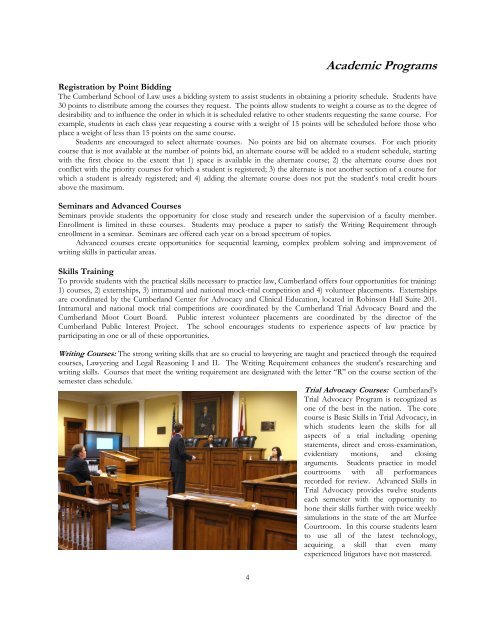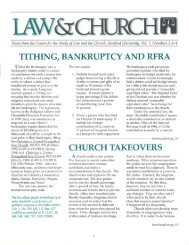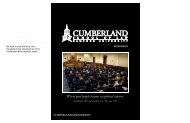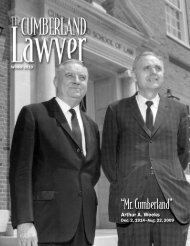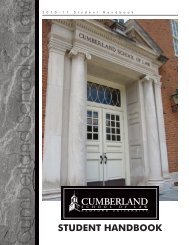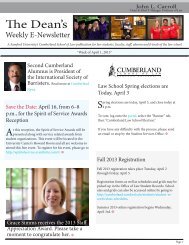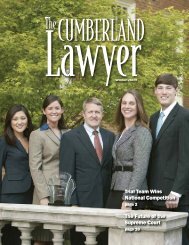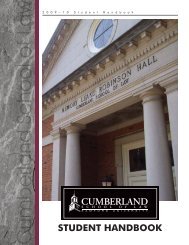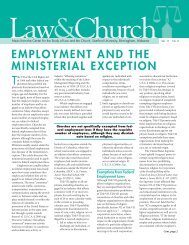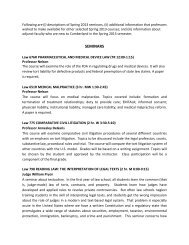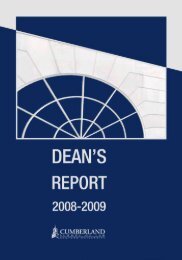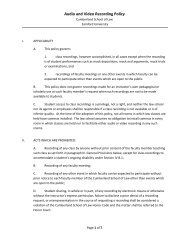Student Handbook - Cumberland School of Law - Samford University
Student Handbook - Cumberland School of Law - Samford University
Student Handbook - Cumberland School of Law - Samford University
You also want an ePaper? Increase the reach of your titles
YUMPU automatically turns print PDFs into web optimized ePapers that Google loves.
4<br />
Academic Programs<br />
Registration by Point Bidding<br />
The <strong>Cumberland</strong> <strong>School</strong> <strong>of</strong> <strong>Law</strong> uses a bidding system to assist students in obtaining a priority schedule. <strong>Student</strong>s have<br />
30 points to distribute among the courses they request. The points allow students to weight a course as to the degree <strong>of</strong><br />
desirability and to influence the order in which it is scheduled relative to other students requesting the same course. For<br />
example, students in each class year requesting a course with a weight <strong>of</strong> 15 points will be scheduled before those who<br />
place a weight <strong>of</strong> less than 15 points on the same course.<br />
<strong>Student</strong>s are encouraged to select alternate courses. No points are bid on alternate courses. For each priority<br />
course that is not available at the number <strong>of</strong> points bid, an alternate course will be added to a student schedule, starting<br />
with the first choice to the extent that 1) space is available in the alternate course; 2) the alternate course does not<br />
conflict with the priority courses for which a student is registered; 3) the alternate is not another section <strong>of</strong> a course for<br />
which a student is already registered; and 4) adding the alternate course does not put the student's total credit hours<br />
above the maximum.<br />
Seminars and Advanced Courses<br />
Seminars provide students the opportunity for close study and research under the supervision <strong>of</strong> a faculty member.<br />
Enrollment is limited in these courses. <strong>Student</strong>s may produce a paper to satisfy the Writing Requirement through<br />
enrollment in a seminar. Seminars are <strong>of</strong>fered each year on a broad spectrum <strong>of</strong> topics.<br />
Advanced courses create opportunities for sequential learning, complex problem solving and improvement <strong>of</strong><br />
writing skills in particular areas.<br />
Skills Training<br />
To provide students with the practical skills necessary to practice law, <strong>Cumberland</strong> <strong>of</strong>fers four opportunities for training:<br />
1) courses, 2) externships, 3) intramural and national mock-trial competition and 4) volunteer placements. Externships<br />
are coordinated by the <strong>Cumberland</strong> Center for Advocacy and Clinical Education, located in Robinson Hall Suite 201.<br />
Intramural and national mock trial competitions are coordinated by the <strong>Cumberland</strong> Trial Advocacy Board and the<br />
<strong>Cumberland</strong> Moot Court Board. Public interest volunteer placements are coordinated by the director <strong>of</strong> the<br />
<strong>Cumberland</strong> Public Interest Project. The school encourages students to experience aspects <strong>of</strong> law practice by<br />
participating in one or all <strong>of</strong> these opportunities.<br />
Writing Courses: The strong writing skills that are so crucial to lawyering are taught and practiced through the required<br />
courses, <strong>Law</strong>yering and Legal Reasoning I and II. The Writing Requirement enhances the student's researching and<br />
writing skills. Courses that meet the writing requirement are designated with the letter “R” on the course section <strong>of</strong> the<br />
semester class schedule.<br />
Trial Advocacy Courses: <strong>Cumberland</strong>’s<br />
Trial Advocacy Program is recognized as<br />
one <strong>of</strong> the best in the nation. The core<br />
course is Basic Skills in Trial Advocacy, in<br />
which students learn the skills for all<br />
aspects <strong>of</strong> a trial including opening<br />
statements, direct and cross-examination,<br />
evidentiary motions, and closing<br />
arguments. <strong>Student</strong>s practice in model<br />
courtrooms with all performances<br />
recorded for review. Advanced Skills in<br />
Trial Advocacy provides twelve students<br />
each semester with the opportunity to<br />
hone their skills further with twice weekly<br />
simulations in the state <strong>of</strong> the art Murfee<br />
Courtroom. In this course students learn<br />
to use all <strong>of</strong> the latest technology,<br />
acquiring a skill that even many<br />
experienced litigators have not mastered.


